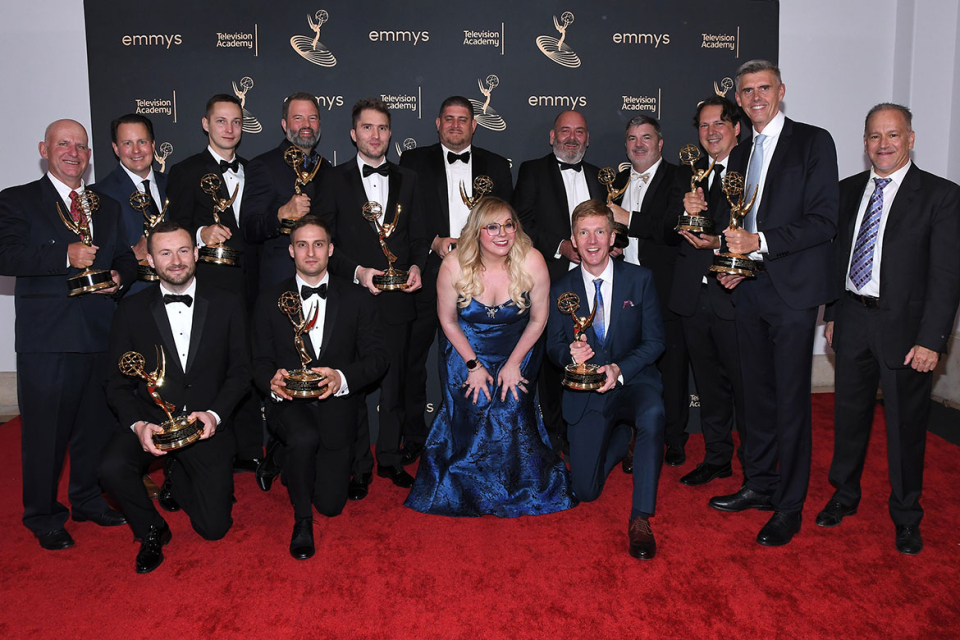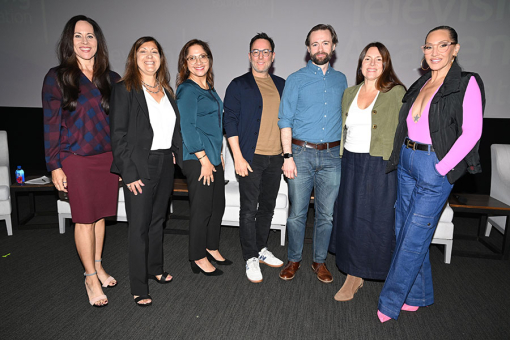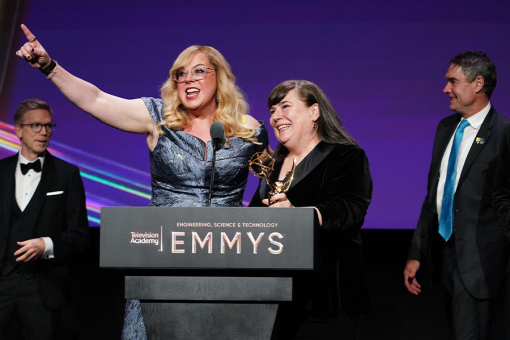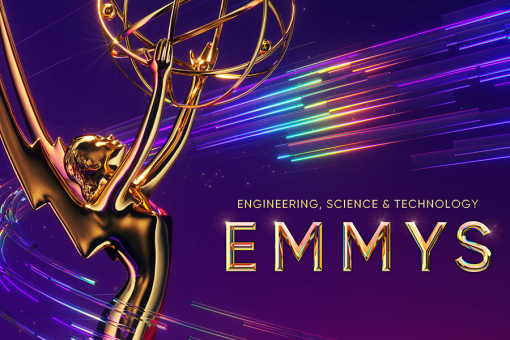It's not often that you hear terms like "4K," "interface" and "firewall" sung to the tune of Tina Turner's "Proud Mary." In fact, there's really only one occasion when you would: during actress Kirsten Vangsness's annual turn as host of the Television Academy's 74th Engineering, Science & Technology Emmy Awards.
And that's exactly what happened during this year's ceremony. Returning for her seventh consecutive hosting stint, Vangsness — who played technical analyst Penelope Garcia for fifteen seasons on the CBS procedural Criminal Minds and will reprise the role in an upcoming Paramount+ reboot — performed a lively opening number paying tribute to the night's honorees with clever lyrics set to classic rock and pop tunes. Audience members cheered and clapped along, fueling the camaraderie that had begun at the cocktail reception, when attendees, some from Europe, greeted colleagues and made new acquaintances.
Held September 28 at the Maybourne Hotel in Beverly Hills, the Engineering, Science & Technology Emmy Awards saw two significant changes, starting with the appellation itself. In March, the Television Academy's Board of Governors voted to rename the Engineering Awards to better reflect the range of accomplishments being honored, a natural progression given the creation of the new Science & Technology peer group that launched January 1. The ceremony was also moved up from its longtime place in late October.
As always, these Emmys recognize individuals, companies or organizations for developments in broadcast technology that elevate television and storytelling. ARRI received the Philo T. Farnsworth Corporate Achievement Award, given in recognition of an agency, company or institution whose contributions have significantly affected television technology and engineering. Founded in 1917 by two German cinematographers, the company has created innovative camera systems, LED lighting and other equipment that have become the industry standard.
Accepting was Dr. Matthias Erb, chairman of the ARRI executive board.
"It's really a great honor for us to be here today to receive this award. Thank you very much," Erb said. "Our two founding fathers, August Arnold and Robert Richter, were working in the film business, and they found they couldn't get the right tools to work with, so they decided to [make] them on their own. Now, we want to support the filmmakers, the industry with our tools. This award is a motivation for us to continue. So, thank you very much again, to the Television Academy."
Dr. Paul E. Debevec received the Charles F. Jenkins Lifetime Achievement Award, which honors a living individual whose ongoing contributions have significantly affected the state of television technology and engineering. He was recognized for his pioneering work in high-dynamic range imaging, image-based lighting and photogrammetry, essential techniques used in computer graphics for VFX and virtual production. His innovations in LED lighting have made it possible to create realistic virtual images of actors from the perspective of multiple elements of illumination.
"I want to thank the Television Academy for this incredible honor and for creating this amazing event to honor the technology and technologists who make the shows that are watched and loved around the world," said Debevec, who is director of production innovation research at Netflix and an adjunct research professor at the University of Southern California. "I dearly hope I get a second lifetime to continue to work with all of you," he said of his current colleagues, "on taking these technologies where we all know they're capable of going. Thank you very, very much."
Seven Engineering Emmys were also bestowed. The recipients were Mark Hills and Marc Bakos of Cleanfeed, for the Cleanfeed Remote Audio Review/Recording System, which enables collaboration with audio quality as high as if all participants were in the same studio; disguise Technologies Ltd. for the disguise Platform, an image processing advancement that integrates and directs numerous technologies to incorporate physical space into a virtual digital environment; Industrial Light & Magic for the StageCraft Virtual Production Tool Suite, which digitally creates the illusion of 3D backgrounds for live action sets; and Geoffrey Crawshaw and William Brinkley of Leostream for the Leostream Remote Access Software, which enables news and entertainment organizations to create secure remote production environments.
And, Shure Incorporated for the Axient Digital Wireless Audio System, which equips audio production teams with wireless capabilities to deliver optimum audio for television and television broadcasts in any setting; Sohonet for ClearView Pivot, a remote collaboration tool for post-production reviews and screenings; and Stype Cajic, Andrija Cajic, Daniel Kruselj and Ivica Antolkovic of stYpe for stYpe Camera Tracking Tools, including StypeKit, which transforms equipment for use in virtual production and RedSpy, a system used to calculate camera position.
Wendy Aylsworth and Barry Zegler are the governors of the Science & Technology peer group. John Leverence is chair of the Engineering, Science & Technology Emmy Awards Committee; Aylsworth and Zegler are cochairs.
For more information on all the recipients and to watch a replay of the event, click here.
To view a photo gallery of the event, click here.











